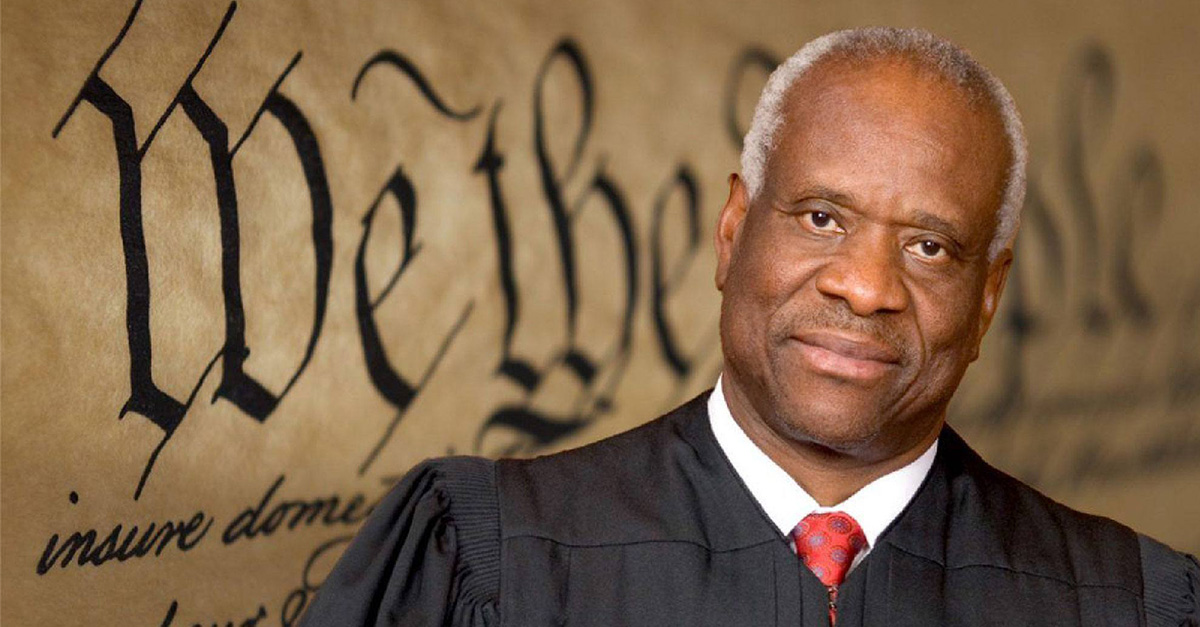


Get a free copy of Parental Rights & Education when you subscribe to our newsletter!

Through hard work, integrity, and determination, Clarence Thomas rose from poverty to become one of history’s most influential Supreme Court justices and conservative thinkers. Here’s why the black community needs to start celebrating and emulating Justice Thomas, rather than allowing progressive liberals to continue to caricature and vilify him.
In today’s society, the increasing prevalence of social justice has resulted in a heightened focus on collective identity and systemic oppression. While addressing injustices is crucial, the framework of intersectionality and the perpetual quest for validation as victims needing reparations ultimately undermine the foundational principles that lead to personal success and societal harmony.
Justice Clarence Thomas’s life epitomizes these principles. His journey from humble beginnings in segregated Georgia to the highest court in the land is a testament to the power of hard work, discipline, and unwavering commitment to one’s values. Rather than seeking validation as a victim, Thomas overcame adversity through personal resilience and determination.
On Sunday, June 23, we had a special occasion to celebrate the birthday of Justice Clarence Thomas, the longest-serving member of the U.S. Supreme Court. His lengthy tenure of over three decades on the bench is a testament to his steadfast commitment and profound impact on American jurisprudence. From his initial nomination to his many influential decisions, Thomas’s career is a remarkable journey marked by perseverance, courage, integrity, and a steadfast dedication to justice.
Thomas’s story is not just about personal success but a testament to the resilience of the human spirit. He represents a narrative of triumph against the odds, living proof that individuals from disadvantaged backgrounds can ascend to the highest echelons of power if they are willing to work diligently to overcome any adversity and remain faithful to one’s foundational principles.
Sadly, within far too many black communities, monuments and murals of figures like Trayvon Martin and George Floyd are the images garnering celebration. At the same time, men like Justice Clarence Thomas are vilified and ostracized.
In stark contrast to those celebrated by Black Lives Matter and other race hustlers, Justice Thomas’s life underscores the importance of individual responsibility and personal accountability, values that should be celebrated and emulated. Recognizing and celebrating the legacy of a man who has dedicated his life to interpreting and upholding the Constitution is crucial.
Clarence Thomas’s journey from the small community of Pinpoint, Georgia, to the highest court in the land is nothing short of extraordinary. Born on June 23, 1948, Thomas’s early years were marked by adversity.
Raised in challenging conditions and speaking Gullah — a mix of African and European dialects — Thomas faced numerous hardships that would shape his character and resilience. Growing up in poverty was one of the lesser challenges faced by being raised by a single mother. As Thomas and his brother matured, the need for a father’s discipline became apparent, leading their mother to make the difficult decision to send them to live with their grandfather.
After moving in with his grandfather, Thomas found a stable, disciplined environment that deeply valued hard work and education. Thomas’s grandfather, Myers Anderson, was a strong Catholic, while his grandmother had been raised Baptist.
Together, they taught young Clarence and his brother that “not only did we deserve to be treated equally, but we also were required to conduct ourselves as children of God. Hence, we were to live our lives according to his Word. My grandparents repeatedly stressed that because of our fallen nature we had to earn our bread by the sweat of our brows. There was no room to doubt this and even less for self-pity. As they saw things, on judgment day we would be held accountable for the use of our God-given talents and our opportunities.”
His grandfather also had a steadfast work ethic and a pragmatic approach to life. He consistently admonished Clarence that, as it pertained to hard work and adversity, he “might give out, but he should never give up.”
When his grandfather learned of Clarence’s decision to leave seminary training immediately after Martin Luther King Jr. was assassinated, Clarence was confronted with the reality that adult decisions have significant consequences. This tough-love approach led to Clarence being asked to leave his grandfather’s home, marking a pivotal moment in his journey.
Thomas later attended the College of the Holy Cross in Massachusetts, where he majored in English literature. He then went on to earn his law degree from Yale Law School in 1974.
After graduating from law school, Thomas worked as a legislative assistant for Missouri Attorney General John Danforth and later served as Assistant Attorney General of Missouri. In 1979, he returned to Washington, D.C., and began working under Secretary William Bennett for the Department of Education.
In 1981, President Ronald Reagan appointed Thomas as Assistant Secretary for Civil Rights at the Department of Education. In this role, he was responsible for enforcing civil rights laws in educational institutions. During his tenure, Thomas gained a reputation as a conservative and often clashed with other civil rights leaders.
He was then asked to serve as a judge on the D.C. Circuit Court of Appeals, considered the most powerful appellate court in the country because its jurisdiction includes the federal government and it typically addresses important questions of constitutional and administrative law.
He would serve there for just two years because on July 1, 1991, President George H.W. Bush nominated Clarence Thomas to the U.S. Supreme Court to replace Thurgood Marshall, the country’s first black justice, who was in poor health and had recently announced his retirement.
Unfortunately, the confirmation process for the Supreme Court would be a nightmare. Instead of being hailed for his achievements and brilliant legal mind, Thomas was “borked,” a term used to describe politically coordinated vilification and deceptive attacks in order to undermine a nomination. The tactics were first used to derail the Supreme Court nomination of Judge Robert Bork in 1987 (and were later used against Justice Brett Kavanaugh, among other judiciary nominees).
Thomas’s legal philosophy of constitutional originalism triggered the abortion movement to wage an all-out war on Thomas, with one member of the National Organization of Women coming right out immediately after his nomination and vowing: “We’re going to bork him. We’re going to kill him politically… This little creep, where did he come from?”
Their threat was made good when at the last minute, a former aide named Anita Hill accused Thomas of making sexually offensive comments in the workplace a decade prior. Thomas “unequivocally, categorically” denied the allegations.
When confronted with the possibility that he might want to withdraw from the process, Thomas drew on both his deep faith and his grandfather’s values, stating: “I’d rather die than withdraw.”
And unlike Robert Bork, Thomas refused to let others define him and fought to defend “my name, my family, my life, and my integrity,” stating in part:
“This is a circus. It’s a national disgrace. And from my standpoint, as a black American, it is a high-tech lynching for uppity blacks who in any way deign to think for themselves, to do for themselves, to have different ideas, and it is a message that unless you kowtow to an old order, this is what will happen to you. You will be lynched, destroyed, caricatured by a committee of the U.S. Senate rather than hung from a tree.”
Thomas’s dignity, righteous anger, and honesty won over the day. He would ultimately be confirmed 52-48, and on October 23, 1991 took his place as an associate justice on the U.S. Supreme Court.
Justice Thomas has since faced significant scrutiny and controversy throughout his judicial career. The progressive left has had no qualms about using the most racist and vile language and tropes against him, including that he’s an Uncle Tom and a “sellout,” in an attempt to undermine his legal credibility and imply that he’s not actually “black.”
Nonetheless, Thomas’s tenure, spanning three decades, has been characterized by a steadfast commitment to his principles and his legal philosophy, notably his belief in a strict interpretation of the Constitution. This conservative stance has sparked debate, particularly when contrasted with the liberal legacy of his predecessor, Thurgood Marshall.
Despite often facing harsh criticism, Thomas’s contributions to landmark decisions on issues like affirmative action, religious freedom, and abortion have been pivotal. His originalist perspective has influenced many key rulings, most notably the 2022 opinion he wrote upholding Second Amendment rights in New York State Rifle & Pistol Association v. Bruen, underscoring his belief in the importance of individual liberty, personal responsibility, and natural law.
Like many justices with a long record of service, Justice Thomas has not been immune to controversy. From his judicial decisions to his personal friendships with wealthy men who donate to conservative causes and candidates, Thomas has encountered his fair share of public scrutiny.
Nevertheless, Justice Thomas has remained undeterred, continuing to serve with the resilience and determination that have defined his career.
As his birthday on June 23 invites us to reflect on his legacy, it’s essential to recognize his profound impact on the Supreme Court and American law. His rulings have often sparked deep philosophical debates about the role of race and equality in our society, making him a polarizing yet pivotal figure.
Justice Thomas’s future on the bench remains uncertain as discussions about potential retirement emerge. However, his story, characterized by overcoming immense odds, continues to inspire. For black Americans and all people from disadvantaged backgrounds, Thomas’s life demonstrates that great success can be achieved through hard work, courage, and unwavering devotion to principles.
As we reflect on his birthday and his continued service, we must seize the opportunity to celebrate men like Clarence Thomas while they are still living and serving faithfully. His dedication to upholding the values enshrined in the Constitution and his influence on the future of American jurisprudence deserve recognition and honor.
As a black American, I find it deeply concerning that Justice Clarence Thomas is not celebrated more widely within our circles. It is a travesty that a man who has achieved so much is vilified and ostracized while figures like Trayvon Martin and George Floyd become central to our collective identity.
The conservative principles of individual responsibility, the rule of law, and personal accountability that Justice Thomas embodies starkly contrast with the collectivist approach of the social justice movement. By focusing on intersectionality and portraying various groups as oppressed classes in constant need of validation and reparation, social justice undermines the very foundation of personal merit and effort that Thomas’s life exemplifies. His story is something that we should write about, talk about, and by all means emulate as it pertains to hard work, steadfast determination, and refusing to give up.
Happy (belated) Birthday, Justice Clarence Thomas!
If you like this article and other content that helps you apply a biblical worldview to today’s politics and culture, consider making a donation here.


Notifications